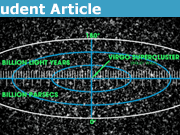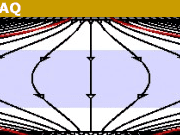Was the Early Universe in a Disordered State?
No. The second law of thermodynamics says that entropy can only increase, so if the early universe had been in a state of maximum entropy, then the cosmos would have experienced its heat death immediately after being born.
Table of Contents
Entropy and the Early Universe: A Paradoxical Beginning
This contradicts the observation that the present universe contains burning stars, heat engines, and life. These observations imply that the early universe was in a very low-entropy state, which shows that its initial conditions were extremely finely tuned. There is no known explanation for this fine-tuning in terms of general relativity, the standard model, or inflation.[Penrose 2005]
These ideas are strongly counterintuitive to most people, since we picture the early universe as an undifferentiated soup of hot gas, very much like what we might imagine a heat-dead universe to be like. In what way is the early universe not equilibrated?
We observe that the cosmic microwave background radiation’s spectrum is a blackbody curve, which would normally be interpreted as evidence of thermal equilibrium. But this observation only tells us that the matter’s degrees of freedom were in thermal equilibrium. The gravitational degrees of freedom were not. In standard cosmological models, which are constructed to be as simple as possible, there are no gravitational waves. Although the real universe presumably does have gravitational waves in it, they are very weak. In a maximum-entropy universe, the gravitational modes would be equilibrated with the matter degrees of freedom, and they would be very strong, as in models like Misner’s mixmaster universe.[Misner 1969]
Gravitational Systems and Thermodynamic Intuition
Even in Newtonian mechanics, gravitating systems violate most people’s intuition about thermodynamics.[Baez] If we pass a bunch of helium atoms into a box through an inlet valve, they will quickly reach a maximum-entropy state in which their density is nearly constant everywhere. But in an imaginary Newtonian “box” full of gravitating particles, we get the opposite result, provided that the particles have some mechanism such as radiation for releasing energy into the environment. The final state is one in which the particles have all glommed onto each other in a single blob. The blob’s entropy has decreased, but this decrease is more than counteracted by the increase in entropy of the environment.
Sources
Charles W. Misner, “Mixmaster Universe”, Physical Review Letters 22(1969)1071. http://astrophysics.fic.uni.lodz.pl/100yrs/pdf/07/036.pdf
Roger Penrose, 2005 talk at the Isaac Newton Institute, http://www.newton.ac.uk/webseminars/pg+ws/2005/gmr/gmrw04/1107/penrose/
John Baez, http://math.ucr.edu/home/baez/entropy.html
PhD in physics. I teach physics at Fullerton College, a community college in Southern California. I enjoy writing, playing viola, brewing beer, climbing and mountaineering.







